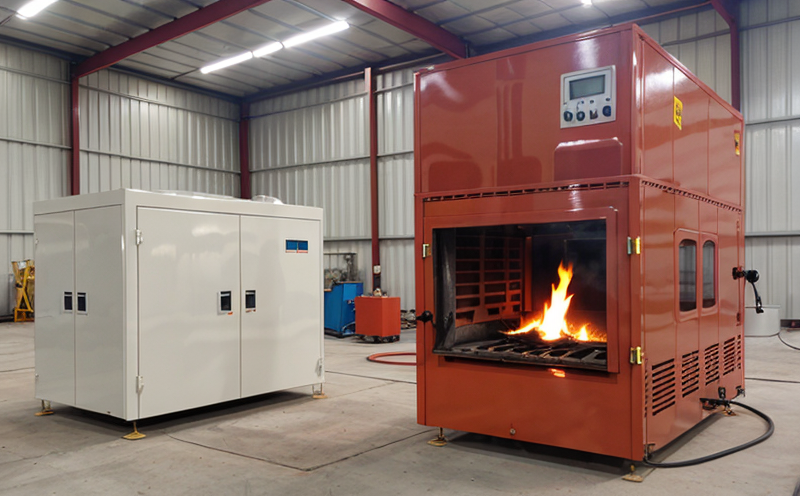ISO 11357-5 Enthalpy Measurement by DSC
The ISO 11357-5 standard provides a robust framework for measuring enthalpy changes during heat treatment processes using Differential Scanning Calorimetry (DSC). This service is essential in metallurgy and material testing as it helps in understanding the thermal behavior of materials, particularly their phase transitions and structural changes. The DSC technique quantifies the energy absorbed or released by a sample at different temperatures, offering critical insights into heat treatment processes.
The application of ISO 11357-5 is widespread across industries such as aerospace, automotive, electronics, and manufacturing. Understanding these thermal properties aids in optimizing heat treatments to improve material properties like hardness, toughness, and ductility without compromising the integrity of the component or device. The test involves precise sample preparation, rigorous calibration procedures, and careful data analysis to ensure accurate results.
In metallurgy, the DSC method is used to study various thermal events such as melting points, crystallization, glass transition temperatures, and decomposition reactions. This information is vital for quality assurance in manufacturing processes where heat treatment is a critical step. The test helps in identifying the optimal heating and cooling rates that minimize residual stresses and improve mechanical properties.
The DSC apparatus used in this service typically consists of a furnace that heats or cools the sample at controlled rates, while an optical cell measures the difference in heat flow between the reference and the sample. This setup allows for real-time monitoring of enthalpy changes as the temperature increases or decreases. The test follows strict protocols outlined in ISO 11357-5 to ensure consistency and reproducibility.
The process begins with meticulous sample preparation, including cleaning, drying, and conditioning the material to remove any contaminants that could affect the results. Once prepared, the samples are weighed accurately and placed into the DSC furnace. The apparatus is calibrated using reference materials before commencing the test. During the heating cycle, the enthalpy changes are recorded as a function of temperature.
The data obtained from the test is analyzed to determine specific heat capacity, melting points, and other thermal properties. These parameters are crucial for understanding how the material behaves under different thermal conditions and for optimizing processing times and temperatures. The results can be compared against established standards or previous data to ensure consistency and quality.
ISO 11357-5 Enthalpy Measurement by DSC is particularly useful in research and development (R&D) environments where new materials are being tested under various thermal conditions. It also plays a vital role in ensuring compliance with international standards, thereby enhancing the reliability and performance of products.
By utilizing this service, clients can gain deeper insights into their materials' thermal behavior, leading to improved product quality and process efficiency. The test results contribute significantly to the development of new technologies and innovations in heat treatment processes.
Eurolab Advantages
- State-of-the-art DSC equipment from reputable manufacturers ensures accurate measurements.
- Experienced technicians with specialized knowledge in thermal analysis provide reliable results.
- Comprehensive quality management systems ensure the highest standards of service and accuracy.
- Access to a wide range of reference materials for precise calibration and validation.
- Support from qualified personnel who can interpret complex data sets effectively.
Eurolab's commitment to excellence in metallurgy and material testing makes it a preferred choice for industries that demand precision and reliability. Our team of experts ensures that every test is conducted according to international standards, providing clients with accurate and actionable results.
Why Choose This Test
- Precision in Measurement: The DSC method provides highly precise measurements of enthalpy changes during heat treatment processes.
- Versatility: ISO 11357-5 applies to a wide range of materials, including metals and alloys, ceramics, polymers, and composites.
- Compliance with Standards: The test ensures compliance with international standards like ISO 11357-5, enhancing product reliability and quality.
- Optimized Processes: By understanding the thermal behavior of materials, clients can optimize their heat treatment processes for better outcomes.
- Data Interpretation: Eurolab's experts provide detailed reports that help in interpreting complex data sets effectively.
- Supportive Environment: A supportive environment ensures that all testing is conducted under controlled conditions, leading to consistent and reliable results.
The ISO 11357-5 Enthalpy Measurement by DSC test is a valuable tool for quality managers, compliance officers, R&D engineers, and procurement specialists. It offers critical insights into the thermal behavior of materials, facilitating informed decision-making in manufacturing processes.
International Acceptance and Recognition
- The DSC method is widely recognized for its accuracy and reliability across various industries.
- ISO 11357-5 ensures consistent results that are accepted globally, enhancing the credibility of test results.
- The technique is used in quality assurance processes to ensure compliance with international standards.
- Results from this test are widely accepted by regulatory bodies and international organizations.
Eurolab's adherence to ISO 11357-5 ensures that clients receive accurate, reliable, and internationally recognized results. This recognition enhances the reputation of products and processes across global markets.





